As I wrote in my most recent book, “The Storm Before the Calm,” we tend to use presidencies as benchmarks to help us locate where we are in time, but it would be a mistake to think that presidents and policies are the true agents of change. In truth, time is the ultimate arbiter of change, and what defines any era are the forces that impose themselves on presidents.
Presidents are elected by aligning with the pressures that already exist, and they govern in response to these pressures. Since the United States is a democracy, that should not be surprising. But even in democracies, there is a belief that presidents are free actors and, as such, design history. But that is not the case. The normal pattern in U.S. political history is that “ineffective” presidents are elected at the end of a 50-year cycle, and that their presidencies exist in social and economic chaos. These presidents usually, through no fault of their own, lose the ability to govern. And in the following election, a president who can change where we are and set the country in a new direction is elected.
Andrew Jackson – the second such president after George Washington – framed his presidency around the vast settler movement (and the associated finances) that was already taking shape. Franklin Roosevelt shaped his presidency around the Great Depression, redefining how the economy worked and preparing the country for war. Ronald Reagan dealt with catastrophic economic circumstances of insufficient capital and demand and military failures that spanned the Middle East. Before a cyclical transition, there must be a president who presides over a country in crisis. His successor presides over the reconstruction of the country.
In order to understand what President-elect Donald Trump’s pressures will be, remember first that no president is free to do whatever he thinks best. In my opinion, Trump did not win the election on economics as is generally thought. His opposition to focusing on culture war issues aligned him with the public, and where he might have won a narrow victory on the economy, he won an overall victory over these cultural issues. That the polls did not recognize this is odd; before the election polls were constantly monitoring this. The main issues on which he ran, then, may not constrain him. Other issues had to do with liberating the economy from constraints, reexamining U.S. military matters and alliances, and ultimately seeking to free the U.S. from the doctrines of the previous administration.
Trump’s first impact will be in trying to redefine cultural norms. He will also try to change tax schemes for corporations. And probably most important, he will try to shift economic, political and military relations with allies. He will impose newly defined economic rules for international trade, increased regard for U.S. interests and the reconsideration of foreign commitments with allies. This does not mean that he will be a rigid nationalist, but that he will demand change to what he thinks of as unbalanced relationships and risks for the United States. When we look at the forces that shape his policies, all of these things are doable, but he will inevitably encounter unexpected resistance as the costs come home. We will see new economic and military models and a new foreign policy. This may seem banal, but it is actually a radical shift, one that addresses U.S. obligations around the world. Put simply, he was elected to redefine the internal dynamics of the country, change its economics and redefine military obligations.
A transitional president like Reagan, Roosevelt or Jackson tends to usher in shifts that are often despised by the establishment until they are successful. One does not need to have supported Trump’s election to see how it will play out.







